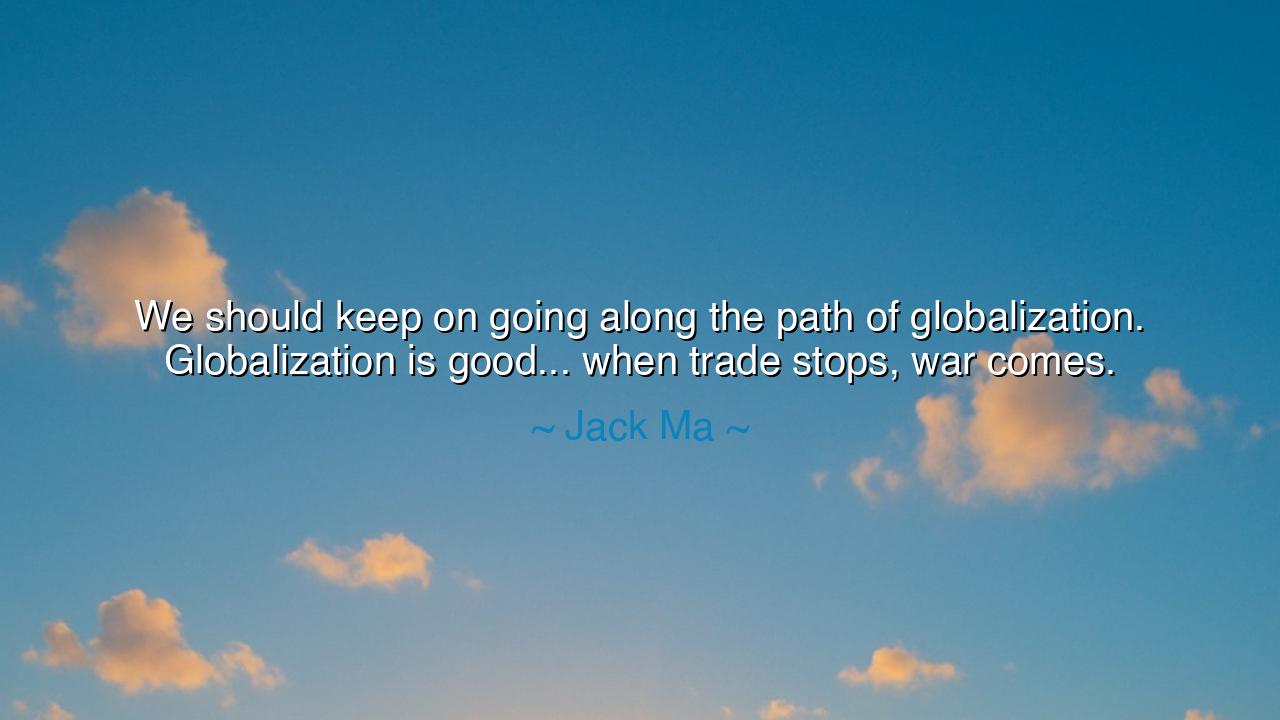
We should keep on going along the path of globalization.
We should keep on going along the path of globalization. Globalization is good... when trade stops, war comes.






Hear, O listener, the words of Jack Ma, a merchant of the modern age, whose insight reaches far beyond commerce: “We should keep on going along the path of globalization. Globalization is good... when trade stops, war comes.” This saying is not merely the reflection of a businessman, but the echo of a truth that has resounded through centuries. For when peoples exchange goods, ideas, and culture, they weave bonds of interdependence. But when they withdraw into suspicion and isolation, they prepare the ground for strife.
The origin of this thought lies in the ancient principle that nations who trade with one another are less inclined to wage war, for war destroys the very channels through which prosperity flows. In Jack Ma’s time, as globalization spread, vast networks of commerce linked Asia, Europe, Africa, and the Americas in ways more intricate than ever before. He saw that though globalization is imperfect, it creates ties of mutual benefit that restrain the hand of violence. For when markets close, when borders harden, when goods cease to flow, mistrust rises like smoke before fire—and soon, war follows.
History itself bears witness. Recall the Silk Road, that ancient artery of trade connecting East and West. Through its caravans came not only silk and spices, but also knowledge, inventions, and cultural exchange. The Silk Road was not free of conflict, yet it fostered long seasons of peace, for empires who prospered from trade were reluctant to destroy the very lifeline that enriched them. When those routes were disrupted, poverty and isolation fed division, and conflict flared. Trade was not merely the movement of goods—it was the weaving of peace.
Consider also the catastrophe of the Great Depression in the twentieth century. As economies collapsed, nations turned inward, erecting tariffs and shutting their doors to global exchange. Suspicion and nationalism flourished in the void, and within a decade, the world was plunged into the Second World War. Jack Ma’s warning recalls this lesson: when trade stops, war comes. Prosperity binds nations to dialogue; isolation hardens them into enemies.
Yet we must not be naïve. Globalization itself is not free of flaws. It creates winners and losers, and sometimes communities feel abandoned or exploited. Still, the remedy is not to tear down the bridges, but to make them stronger and fairer. For though trade can be unjust, the absence of trade brings something worse: the collapse of cooperation and the rise of hostility. Thus Ma’s counsel is both pragmatic and visionary—sustain the flow of exchange, but guide it with wisdom, lest it become domination rather than partnership.
The deeper meaning of his words is this: human beings are bound together, whether they acknowledge it or not. The farmer, the artisan, the trader, the shipper—all rely upon one another across borders and seas. To sever these bonds is to pretend that nations can live in solitude, yet history shows that such solitude breeds fear, and fear breeds war. Trade is not only about wealth—it is about the recognition of shared humanity. To buy from another is to say, “I need you,” and to sell to another is to say, “You need me.” In this mutual need lies the seed of peace.
Therefore, O child of tomorrow, heed this teaching: nurture the bonds of exchange in your own life. Build bridges with others through dialogue, through cooperation, through acts of trust. Resist the temptation to retreat into suspicion when conflict arises; instead, strengthen the ties that make hostility unthinkable. For Jack Ma has spoken a truth as old as civilization itself: globalization is good... when trade stops, war comes. Let us not abandon the marketplace of humanity, for within it lies not only prosperity, but also the fragile yet enduring hope of peace.






HLMy Huyen Le
Ma's statement about globalization reminds me of how economies are increasingly linked, but it also makes me wonder: does globalization create its own set of challenges? While it may reduce the likelihood of traditional war, it could also spark new forms of conflict, like economic warfare or cultural clashes. Can we truly say that globalization is a cure for war, or does it simply shift the dynamics of conflict to new areas?
VLVi Le
This quote seems to suggest that globalization is a peaceful force, yet history shows that trade doesn’t always prevent war. Could it be that economic ties can lead to conflict when countries feel they are being unfairly treated or exploited? While globalization may reduce the likelihood of war between trading partners, does it also make nations more vulnerable to other types of tension, such as cyber warfare or economic sabotage?
TQnguyen thuc quyen
Ma’s perspective is thought-provoking, especially considering how deeply interconnected economies have become. But I wonder, is globalization always beneficial for everyone involved? While it might prevent war between nations, does it contribute to inequality or environmental degradation? Could the globalized economy actually make some conflicts worse by creating divisions or fueling competition over resources, even while promoting trade?
GDGold D.dragon
Jack Ma’s quote presents globalization as a force for peace, where trade is seen as a mechanism to avoid conflict. But could this view oversimplify the complexities of global relations? Trade can foster interdependence, but it can also create tensions and inequalities. Is it really the case that when trade stops, war is inevitable, or are there other factors at play, like politics, culture, or resource scarcity, that contribute to conflict?